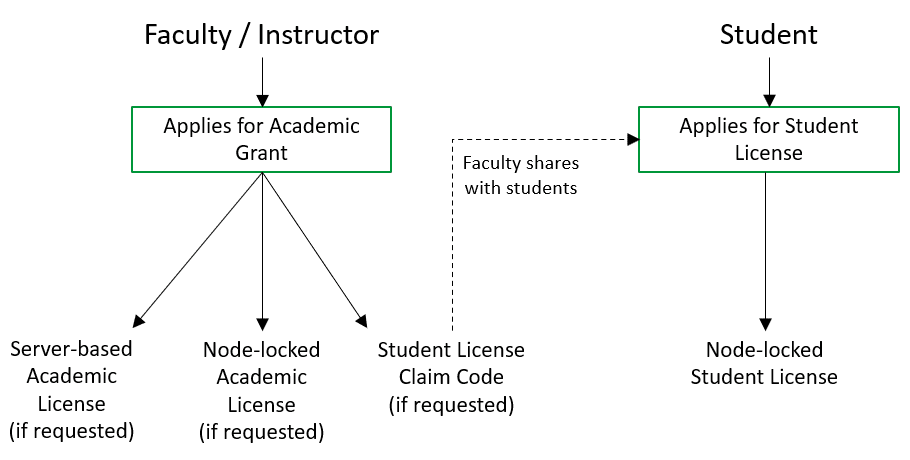
Academic Licensing Process
Complete details about and application instructions for Simio’s Academic Licensing Program
Academic License Types
Using an academic license (either type) within Simio is functionally equivalent to Simio RPS and imposes no limits on model size or complexity. Academic licenses are provided at no cost through the Academic Grant Program and are valid for one calendar year from the date of award and may be renewed.
Academic licenses are available as node-locked or server-based. Node-locked licenses are assigned to individual computers. Server-based licenses are accessible from any computer on a network. A common use-case is where server-based licenses are used for managed computer labs and node-locked licenses are used for faculty/instructor computers.
Academic licenses are valid only for non-commercial work. We recognize that funded research projects and student projects are important uses of Simio in academic institutions. In cases where students/faculty work with commercial or governmental entities, the research/project work must be publicly available as case studies or white papers and the company/sponsor’s name must be included. If you are interested in commercial licenses to support proprietary commercial research projects, please contact us at academic@simio.com to learn what licensing options are available.
The two academic license types are shown below.
Simio Academic
Simio Academic licenses are for university-owned and faculty-owned computers (typically faculty offices, student labs, research labs, and faculty notebooks). These licenses can be node-locked or server-based and are licensed to the university.
Simio Student
Simio Student licenses are for student-owned computers. These licenses are node-locked and are licensed to the individual students.

Academic Licensing Process
The licensing process includes two steps: Applying for an Academic Grant and applying for student licenses. The faculty member/instructor first applies for an Academic Grant. If the grant is approved, the applicant receives the requested licenses and the Student License Claim Code (if requested). The applicant then shares the Student License Claim Code and application link with their students who wish to apply for an individual Student License.
If a student uses a valid Student License Claim Code and their email address is from the same domain that was used in Academic Grant process, the Student License is automatically approved and sent to the student. If the student does not have a Student License Claim Code, the student must provide their university name, department name, course name, and instructor name (if available), along with a detailed description of the project or course for which they will use the license. Once the student is verified to be eligible, the Student License is sent to the student.
The easiest and most efficient way for students to get Student Licenses is by using a valid Student License Claim Code. So, if you plan to use Simio in a class, make sure that your instructor provides the code and, even if you’re not using Simio as part of a class, if one of your faculty members/instructors has an Academic Grant, they can provide you the code — the code does not have to be tied to a specific class.
Applying for Academic Grants and Student Licenses
Academic license requests (both types) are made through web forms. Four things to keep in mind when you apply:
- The more accurate and complete the information you provide, the easier it will be for us to verify your eligibility and the faster the approval and fulfillment process will be.
- Licenses and other information will be sent via the academic email address that you provide. Make sure that the email address that you provide is valid and can receive email from outside your university/institution.
- Academic Grants are available only to qualified faculty members, instructors, and IT Staff that support faculty. Make sure that you provide a web link (university, LinkedIn, Google Scholar, etc.) that we can use to verify your status.
- If you are a student, apply for a Student License, not an Academic Grant.
Academic Licenses through an Academic Grant
In order to complete the grant request form, you will need the following information (in addition to the standard identification information):
- The number of users for your node-locked license (if required)
- The number of users for your server-based license (if required)
- The approximate number of students in your classes (if you are requesting Student Licenses). This number does not need to be exact — a “best guess” will do.
- If you are renewing an existing grant, the previous Grant Identifier (format: AG-00000000-00000). This code can be found in the original grant award email.
If you have questions or need additional information prior to applying, contact us at academic@simio.com. Detailed information about installing the two license types (node-locked and server-based) is provided below. If you work in a managed computer environment, it is easier to consult your IT staff about this choice before you apply so that you can make the right choices on the application form.
Student Licenses
If you have a valid Student License Claim Code and your email address has the same domain as used for the Academic Grant, this process will be automatic, and you will receive the license within an hour or so of submission.
If you do not have a Student License Claim Code, make sure that you provide the following information in the Additional Details section of the form:
- University/institution name
- Department name
- Course name (if using as part of a course)
- Faculty/instructor name (if using as part of a course or a research project)
- Description of your project/research/course.